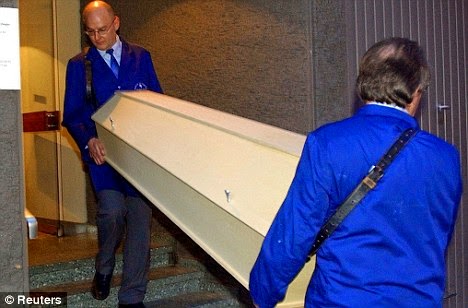International Chair - Euthanasia Prevention Coalition
A journal article on a pilot study concerning assisted suicide in Switzerland has resulted in significant media promotion of the legalization of assisted suicide. Assisted suicide causes the death of people and the issue deserves further investigating concerning its actual practice in Switzerland.
I
 |
| Pietro D'Amico |
The father-of-one made the decision after a wrong diagnosis from Italian and Swiss doctors, his family's lawyer Michele Roccisano told Italian newspaper Corriere della Sera.
An autopsy carried out by the University of Basel’s Institute of Forensic Medicine found that D’Amico was not suffering from a life-threatening illness at the time of his death.
Roccisano called on the Italian and Swiss authorities to examine D’Amico’s medical records to determine what went wrong.In February, 2014 the Daily Mail reported that:
Oriella Cazzanello, 85, travelled to the Dignitas suicide clinic in Basel, Switzerland, where she paid €10,000 for an assisted suicide because was unhappy about losing her looks.
Cazzanello, who was in good mental and physical health, left her home in Arzignano, near Vicenza in northern Italy, without telling her relatives where she was going.
Her family, who had reported her to the police as missing, only learnt of her death after they received her ashes and death certificate from the clinic.
 In July 2013, a Swiss regional court found Dr. Philippe Freiburghaus “crossed the line” by assisting a suicide without obtaining a diagnosis.
In July 2013, a Swiss regional court found Dr. Philippe Freiburghaus “crossed the line” by assisting a suicide without obtaining a diagnosis.On April 23, 2014, Dr Freiburghaus was acquitted for assisting a suicide without a diagnosis. The reasons for the acquittal were not made public.
An 89-year-old British woman died by assisted suicide in Switzerland because she felt alienated from the modern world.
In May 2013, the European Court of Human Rights said that Switzerland did not provide clear enough guidelines on who could obtain lethal drugs.
The Dignitas suicide clinic has been connected to several other controversies including:
In May 2013, the European Court of Human Rights said that Switzerland did not provide clear enough guidelines on who could obtain lethal drugs.
A study published in the Journal of Epidemiology examined 1301 assisted suicide deaths in Switzerland and found that:
Women, highly educated, divorced and rich people are more likely to die from assisted suicide, new research has revealed and around 16 per cent of death certificates did not register an underlying cause. In other words, they had no underlying illness.
A previous study of suicides by two right-to-die organizations showed that 25 per cent of those who died had no fatal illness, instead citing 'weariness of life' as a factor.
Recently a Swiss assisted suicide group decided to extend suicide assistance to healthy elderly people who are living with some form of physical or psychological pain.
The most recent study titled: Suicide tourism: a pilot study on the Swiss phenomenon only examines the assisted suicide deaths of suicide tourists who died at the Dignitas suicide clinic. This study seems to promote the legalization of assisted suicide in countries that suicide tourists most often come from. This study admits that Switzerland lacks any effective controls of its suicide business and it acknowledges that there is an increasing number of deaths by non-terminal people.
- The assisted suicide death of a UK man with dementia.
- Dignitas founder, Ludwig Minelli, was reported to be making millions on assisted suicide.
- Former Dignitas employee, Soraya Wernli, spoke about the many abuses at the Dignitas suicide clinic.
- Dignitas allegedly dumps 300 cremation urns into Lake Zurich.


No comments:
Post a Comment